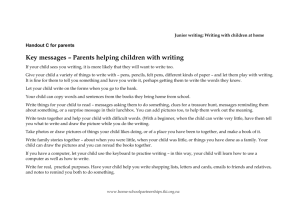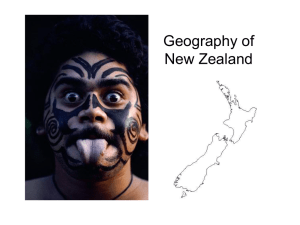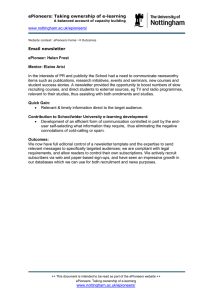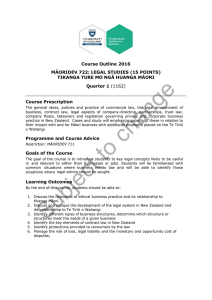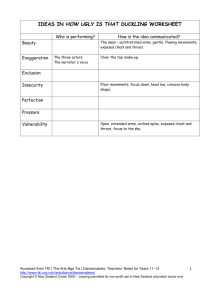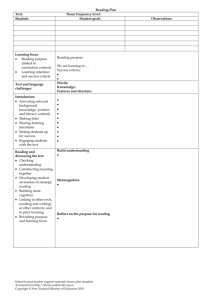Issue 1 | Terms 1 and 2 | March 2009
advertisement
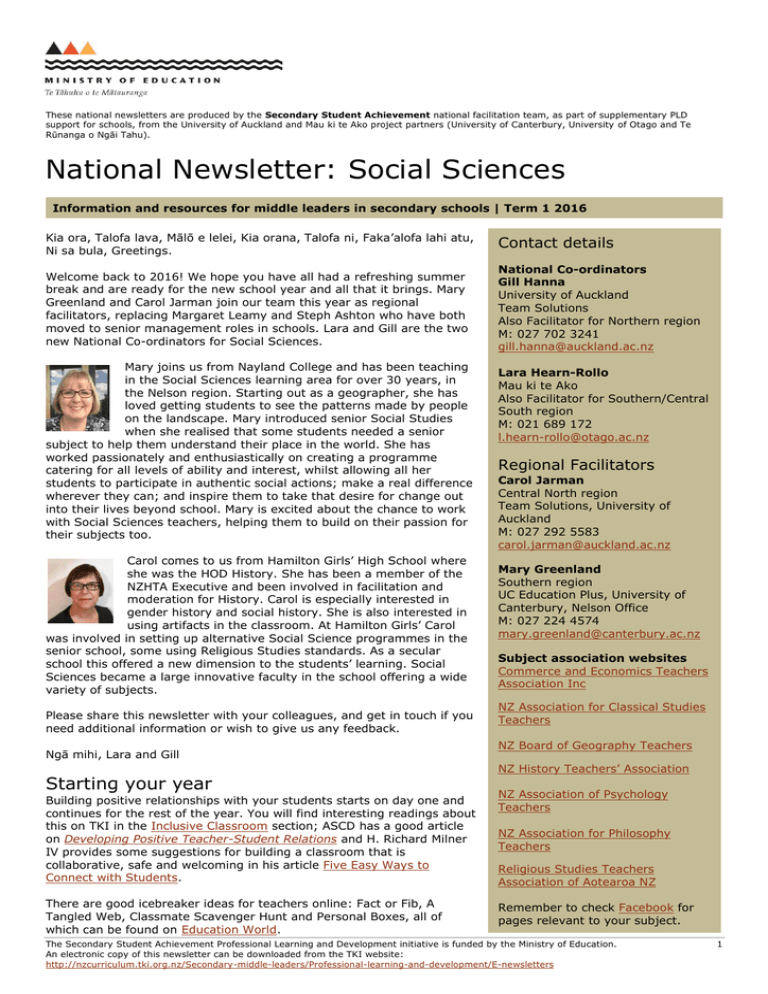
These national newsletters are produced by the Secondary Student Achievement national facilitation team, as part of supplementary PLD support for schools, from the University of Auckland and Mau ki te Ako project partners (University of Canterbury, University of Otago and Te Rūnanga o Ngāi Tahu). National Newsletter: Social Sciences Information and resources for middle leaders in secondary schools | Term 1 2016 Kia ora, Talofa lava, Mālō e lelei, Kia orana, Talofa ni, Faka’alofa lahi atu, Ni sa bula, Greetings. Contact details Welcome back to 2016! We hope you have all had a refreshing summer break and are ready for the new school year and all that it brings. Mary Greenland and Carol Jarman join our team this year as regional facilitators, replacing Margaret Leamy and Steph Ashton who have both moved to senior management roles in schools. Lara and Gill are the two new National Co-ordinators for Social Sciences. National Co-ordinators Gill Hanna University of Auckland Team Solutions Also Facilitator for Northern region M: 027 702 3241 gill.hanna@auckland.ac.nz Mary joins us from Nayland College and has been teaching in the Social Sciences learning area for over 30 years, in the Nelson region. Starting out as a geographer, she has loved getting students to see the patterns made by people on the landscape. Mary introduced senior Social Studies when she realised that some students needed a senior subject to help them understand their place in the world. She has worked passionately and enthusiastically on creating a programme catering for all levels of ability and interest, whilst allowing all her students to participate in authentic social actions; make a real difference wherever they can; and inspire them to take that desire for change out into their lives beyond school. Mary is excited about the chance to work with Social Sciences teachers, helping them to build on their passion for their subjects too. Carol comes to us from Hamilton Girls’ High School where she was the HOD History. She has been a member of the NZHTA Executive and been involved in facilitation and moderation for History. Carol is especially interested in gender history and social history. She is also interested in using artifacts in the classroom. At Hamilton Girls’ Carol was involved in setting up alternative Social Science programmes in the senior school, some using Religious Studies standards. As a secular school this offered a new dimension to the students’ learning. Social Sciences became a large innovative faculty in the school offering a wide variety of subjects. Please share this newsletter with your colleagues, and get in touch if you need additional information or wish to give us any feedback. Ngā mihi, Lara and Gill Starting your year Building positive relationships with your students starts on day one and continues for the rest of the year. You will find interesting readings about this on TKI in the Inclusive Classroom section; ASCD has a good article on Developing Positive Teacher-Student Relations and H. Richard Milner IV provides some suggestions for building a classroom that is collaborative, safe and welcoming in his article Five Easy Ways to Connect with Students. There are good icebreaker ideas for teachers online: Fact or Fib, A Tangled Web, Classmate Scavenger Hunt and Personal Boxes, all of which can be found on Education World. Lara Hearn-Rollo Mau ki te Ako Also Facilitator for Southern/Central South region M: 021 689 172 l.hearn-rollo@otago.ac.nz Regional Facilitators Carol Jarman Central North region Team Solutions, University of Auckland M: 027 292 5583 carol.jarman@auckland.ac.nz Mary Greenland Southern region UC Education Plus, University of Canterbury, Nelson Office M: 027 224 4574 mary.greenland@canterbury.ac.nz Subject association websites Commerce and Economics Teachers Association Inc NZ Association for Classical Studies Teachers NZ Board of Geography Teachers NZ History Teachers’ Association NZ Association of Psychology Teachers NZ Association for Philosophy Teachers Religious Studies Teachers Association of Aotearoa NZ Remember to check Facebook for pages relevant to your subject. The Secondary Student Achievement Professional Learning and Development initiative is funded by the Ministry of Education. An electronic copy of this newsletter can be downloaded from the TKI website: http://nzcurriculum.tki.org.nz/Secondary-middle-leaders/Professional-learning-and-development/E-newsletters 1 National Newsletter: Social Sciences Waitangi Day In 1840 Te Tiriti o Waitangi was signed at Waitangi in the Bay of Islands. What is considered to be New Zealand’s founding document was signed by representatives of the British Crown along with over 500 Māori chiefs in that year. It took until 1974 for the day to be recognized as a public holiday despite it being officially commemorated for the first time in 1934. Waitangi Day is often the focus of protest, and opposition to Te Tiriti has existed even before it was signed. The perspectives that have led to this protest can provide the basis for a wonderful unit on the Treaty based on our Level 5 achievement objective “Understand how the Treaty of Waitangi is responded to differently by people in different times and places”. A good start for this would be to contact your local runaka/rūnanga, through their website, and talk to them about the possibility of their support to help explore the perspectives held by the iwi both at the time of the signing and now. Starting at a local level could then allow you to branch out to a regional level and then to the national picture. Your Māori students might be able to help with this as well. Co-constructing a study that enables each student to identify the different perspectives, the reasons for these perspectives and the actions taken as a result could allow teachers and students to build a unique picture of Te Tiriti specific to each student and their background. It would seem opportune this year to link the flag referendum to Waitangi Day. What does our flag say about our history, our identity as a nation? What are the implications of removing the Union Jack? What viewpoints are being expressed about the flag options and what values and perspectives underlie these? This page is a useful starter. Psychology At the end of last year the Ministry and NZQA announced a rewrite of the psychology NCEA standards as achievement standards, opening the way for the subject to become university approved. The plan is for the writing and trialing to take place this year with the approved standards ready to launch in 2017. This will be good news for many Social Science teachers keen to include psychology standards in their teaching courses. Fieldtrips for teachers Asia There are a number of AsiaNZ fieldtrips available for teachers to Indonesia, Singapore, Korea and Shanghai. Designed to strengthen links between New Zealand and Asia, applications are currently open for the Singapore Cultural Connections trip. If you are interested click here Israel The Yad Vashem seminar for teachers from New Zealand is also worth exploring. There is an informative clip found here and if you are teaching the Holocaust, then this would be something to look at. Keep an eye on the New Zealand Friends of Israel page for information about this trip. USA The Study of the US Institutes (SUSIs) for scholars and secondary educators is another programme designed to enable teachers to strengthen curricula knowledge about the USA. These are five week-long programmes consisting of a four week residency and one week educational study tour. If you’re interested in this see more at United States Department of State. 2016 national workshops Term 1 2016 ‘Courageous Classroom Conversations’ This year’s national workshops focus on engaging students through courageous conversations in the classroom. We’ll look at strategies to conduct these in a safe environment and how they contribute to students’ understanding of perspectives. Whangarei Auckland North Auckland Central Auckland South Hamilton Napier Gisborne Rotorua New Plymouth Palmerston North Wellington Nelson Christchurch Dunedin Greymouth Invercargill April 11 April 13 April 12 April 14 April 7 April 5 May 4 April 6 April 6 April 7 April 8 April 14 April 12 April 14 April 13 April 13 Waitangi Day links Explore the Treaty NZHistory Classroom ideas Treaty of Waitangi Past and Present To prompt initial discussion around other perspectives on Waitangi Day these pages might provide a good starter. Asking the students to list what they see, discuss people’s expressions and words used, might stimulate discussion on stereotype, bias and missing voices. A comparison between this view and reality could also be drawn by looking at media coverage of Waitangi Day in previous years and newspaper articles after February 2016. Assessment matters from NZQA Assessment Specifications for external standards now available. Subject specific pages Quick links to these are here: Accounting Business Studies Classical Studies Economics Education for Sustainability Geography History Legal Studies Media Studies Psychology Religious Studies Senior Social Studies Sociology The Secondary Student Achievement Professional Learning and Development initiative is funded by the Ministry of Education. An electronic copy of this newsletter can be downloaded from the TKI website: http://nzcurriculum.tki.org.nz/Secondary-middle-leaders/Professional-learning-and-development/E-newsletters 2 National Newsletter: Social Sciences e-learning in the Social Sciences The New Zealand Curriculum (2007) has e-learning under the effective pedagogy section and is an aspect of teaching and learning that is constantly changing. The curriculum defines e-learning as ‘learning supported by or facilitated by ICT’ and notes there is considerable potential for this to support the teaching approach (NZC, p36). elearning therefore is about utilizing ICT to promote effective teaching and learning, and allowing students the opportunity to learn at their own pace. Many schools are choosing to experiment with a variety of approaches and platforms with the objective that students will be able to explore and experiment by: Thinking critically and working creatively Reflecting and planning Using feedback and self-assessment, and Creating new knowledge. Of the approaches seen so far by facilitators, most have been innovative and creative, having been designed to enhance students’ learning and create new learning environments. By customising learning experiences, teachers are able to recognise individual, cultural, and developmental differences. Partnerships can be built enhancing communication and collaboration beyond the classroom, expanding the community of learners and enhancing the quality of learning. This in turn can create new education communities by increasing the modes of teaching and learning, and the range of people who can be involved. (http://elearning.tki.org.nz/Teaching/Curriculumareas). Pedagogy Wheel The Pedagogy Wheel is a useful tool for teachers showing the links between apps, learning objectives, cognitive development actions etc. and has great potential for use in the creation of learning courses making best use of iPads. The poster (http://www.unity.net.au/padwheel/padwheelposter.pdf) itself has a number of direct links to other supporting online resources, and is well worth a look. Term 1 2016 Useful tools, apps and links VideoNotes This has to be the simplest way to take notes which are automatically synchronized with the clip being watched. VideoNotes allows you to load any YouTube video on the left hand side and on the right is a note pad/ Type on this and your notes are synched with that spot on the video. It then integrates with a Google Drive account meaning you can share your notes and collaborate on them. If you’re not sure how to use them there is a demo here. Socrative Socrative allows teachers to engage and assess their students as learning happens and is compatible for all devices. While it is designed for the American curriculum, it can be adapted and used for our classrooms as well. OneNote There is considerable potential in this app for personalizing learning, collaborating and building online portfolios of work which could then be submitted for moderation electronically. OneNote can be used anywhere, anytime and on any device you have it downloaded to. Share notebooks with colleagues and classmates and build a learning community. Chalk The key to e-learning is to ensure that the tool being used is enhancing learning and providing students with a new method of demonstrating their understanding, not simply replacing the same task with a digital tool. In Social Sciences this could look like: Annotating a news clip using VideoNotes Using digital portfolios, or OneNote for research purposes Designing an online quiz using Socrative Using Edmodo or Facebook to collaborate. This is an app designed to assist teachers. If you would like to use an online plan book then this is for you. You can plan your lesson, attach resources, share these with your colleagues, link to sites, set up mark books, attach your own standards to these, create your own rubrics, keep a running record - and more. A site of interest For examples of e-learning in the Social Sciences, keep an eye on the ‘Enabling e-learning’ page on TKI. The Secondary Student Achievement Professional Learning and Development initiative is funded by the Ministry of Education. An electronic copy of this newsletter can be downloaded from the TKI website: http://nzcurriculum.tki.org.nz/Secondary-middle-leaders/Professional-learning-and-development/E-newsletters 3
